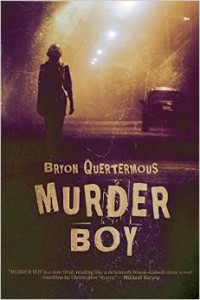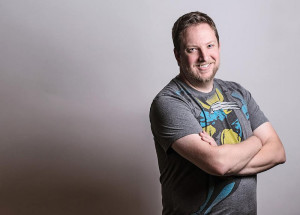by Bryon Quertermous, @bryonq
I’d always hoped that I would have my second book written before my first book was published and before the reception (good or bad) of the first book was known. Alas, I was not able to pull that off and I’m only about halfway through writing the sequel. In addition to writing under a deadline for the first time and the general issues that come with writing about the same characters again and keeping them fresh, the thing I’ve struggled with most is how much to stretch myself as a writer.
I’ve been very lucky to have a great reception for my first novel. It’s received great reviews, seems to be selling well, and the notes I get from readers are mostly positive. So it would seem to make sense that if I’m writing another book I’d want to do whatever I did the first time that got me this great reception, right? Well, sort of. I certainly want to keep readers happy, but I’ve had horrible luck any time I’ve ignored my instincts and tried to write toward what I thought readers expected. But I’ve also seen friends publish well-received novels and then get slammed when their next book goes in a different direction. I sure don’t want to torpedo my career before it’s even begun.
Aside from style and subject matter, there’s also the issue of confronting one’s weaknesses as a writer and whether or not to stretch and get better. For myself, this is plotting. I SUCK at traditional mystery plotting. In an effort to keep readers in suspense I end up over-complicating my plots to an absurd degree. It’s so bad that I don’t really anticipate facing down that demon until several more books down the line. Does that make me a weak writer? Maybe. But that’s the thin line an artist walks when they share their work with the world. I’ve always had high commercial ambitions for myself and that means making sacrifices once in a while. The key is to find a way to give readers what they want and what they expect in a way that maybe they don’t expect.
In the case of the next book I’m working on, I plan on stretching myself with my characters. I have a tendency with my supporting characters to create them more as caricatures than living, breathing people. This is a benefit of writing series fiction. I have the opportunity to go back to characters I may have just sketched out in book one and start filling in the details and shading that make for great characters. I also plan on stretching myself by not relying on easy jokes and meta jokes to power my narrative. I solved a lot of story problems in my first book by having the main character point to the fact that he wasn’t in a story and things in real life don’t always go the way they do in fiction. I think it worked well for the first book but it’s not a well I want to go back to again.
So that’s what my balance looks like. How about the other writers out there? Is it better to sacrifice some readers to attempt things that might fail but can make you a better writer? Is it better to forget stretching at all and keep giving readers what they want book after book?
Bryon Quertermous is the author of the novels Murder Boy and the forthcoming Riot  Load. His short stories have appeared in Plots With Guns, Thuglit, and Crime Factory among others, and in the anthologies Hardcore Hardboiled, The Year’s Finest Crime and Mystery Stories, and Uncage Me. He was shortlisted for the Debut Dagger Award from the UK Crime Writers Association. He currently lives outside of Detroit with his wife and kids.
Load. His short stories have appeared in Plots With Guns, Thuglit, and Crime Factory among others, and in the anthologies Hardcore Hardboiled, The Year’s Finest Crime and Mystery Stories, and Uncage Me. He was shortlisted for the Debut Dagger Award from the UK Crime Writers Association. He currently lives outside of Detroit with his wife and kids.

I guess I’m not really in a place to say – only as a human – not as a PUBLISHED writer – but I say your real readers – the ones that you want to be writing for – would want you to stretch and grow. It is sort of like being a politician – sure you want to keep your promises (what a concept!) but also you have to trust that folks put you in that spot to lead -not to pander. I say you’re a writer because you have something to say and a certain way of saying it – don’t stop growing and developing that vision. Challenge your readers and yourself.
I didn’t have my second book written when my first came out. I think you can work that to your advantage because you will know what fans want. And I think you can balance giving them more of what they want along with going in a new direction.
Good luck, Bryon!
Thanks for the comments. I think you’re mostly right, Jan. And I’ve seen that born out in my limited book touring experience. People react favorably to my stories of struggling to stretch myself and write what I wanted. But it’s also easy to fall into the trap of just writing for a limited audience and getting blinded by that. I’d like to write for as wide and audience as possible.
Alex, you’re also right. Now that I’m in this situation with my second book I’m finding ways to turn it to my advantage. Play the hand you’re dealt, right?
I’d like to have a few books ready to go when I’m ready to publish. I’d like to feel I’ve got a few under control before that point, but life doesn’t always work out the way we’d like. Sounds like you plan is going to work out just fine!! Good luck :)
Elizabeth – Thanks for hosting Bryan.
Bryan – I think you’re absolutely right about ‘stretching’ your characters. After all, real humans evolve, grow and change over time. Why wouldn’t characters? And we all face a number of different situations throughout life. So it makes sense that characters would, too. Allowing for that makes sense.
Its great to meet Bryon. I long ago took my editors advice ans simply wrote the book. Forget about thinking about what readers expected or the page length and word count or the genre. Write the damn book was his advice. Then figure everything else out after the fact.
Stephen Tremp
an A-Z Cohost
@StephenTremp on Twitter
“A limited audience” is, I think, a straw man.
There are about 1.5 billion English speakers on earth. if you write for 1% of 1% of 1% of them, you have enough to make a good living as a writer. Drop that last reduction, and you’re wildly wildly popular.
Breadth and depth of reach in art are devilishly hard to tie together. Create something that appeals broadly and it’s highly unlikely you’ll touch very many people deeply. On the other hand, create something that touches a niche deeply, and you give yourself a chance for them to spread the word and become a hit.
I wrote an entire book on the topic, “Hits or Niches.” I feel absolutely that creating art for a niche is your only hope of ever having a hit — and you can’t intentionally aim at a wider audience, that has to happen on its own.
Congratulations on your novel! I wish I had all the answers, but of course I don’t. I’ve just tried to write the best novel I could while also pushing myself to learn more and become better. I try not to think too hard about what people will think, because if I did, I wouldn’t write a single word! Good luck on your next release.
I wish you the greatest luck with your series, Bryon. I found writing a series a bit too confining for my personal writing goals. I didn’t start writing seriously until retirement, so I don’t have big commercial ambitions. As a result, I can wander around the crime fiction genre experimenting with form and plot and character and see what comes of it. Rather than please the first round of readers I had for my amateur sleuth mysteries, I focused on finding the new readers who would appreciate suspense, and now I’m at it again with a historical mystery that’s a crossover to women’s fiction. It’s a little crazy, but it’s also a lot of fun.
Let me know when you are coming to A2.
We can meet, I’ll buy the beer, and we can trade murder notes. I’m working rural noir now. Murder Boy on this week’s buy list.
I’m snaking two sets of conflicts together and boy, do I understand your line about complications.
Thank Dog for Chandler. Just put a body in the living room and run it to ground.
If A2 is Ann Arbor, I’ll be there tomorrow for the official Murder Boy Launch Party!
It’s funny about the series thing because I never intended for it to be a series until my editor asked me if I had another idea ready to go for a two-book contract.
I think it’s good to listen to the readers. They see beyond what we see, in our closeness. However, if we do everything a reader wants, then the writing becomes their voice and not ours.
I’ll see you at Aunt Agatha’s for cake!
Arbor brewing is fifty steps away!
Congrats.
Thanks. It was good to meet you in person!
First you need to decide one important thing: Are you an artist or an entertainer? You cab be both. But most genre writers are usually entertainers (I’m and example of such a writer). I have no illusions that my stories will shake the world to its foundation or make people view their lives differently. I am perfectly satisfied knowing that I entertained my readers and helped them tolerate an otherwise stressful and scary world.
This guides my plots and my career. Sure. I find time to write for myself, but I rarely let it out into the big bad world. “For me” means “for me”. Not the “I write for me” nonsense a writer will spout off during an interview so that they come off as thoughtful and independent. If you write for you and only you, what is the point in publishing?
I’m not saying you can’t grow or that you should be a complete slave to your readers. If you feel a story should change then change it. But I think it begins with being honest with yourself about where you fit in as an author.